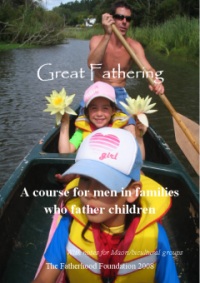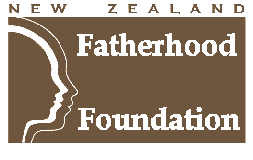Who we were:
The Fatherhood Foundation (formerly NZ Father & Child Society) was an organisation committed to the fostering of quality fathering in New Zealand from 1998 until 2015.

Our tasks are to:
- Provide education and skill-building for fathers and other men fathering our nation's children
- promote research that is specifically about fathering in NZ
- promote the safety and wellbeing of the children of NZ
- produce material that increases awareness of the importance of fathering
- educate on the reasons why fatherhood is critical for our nation
- assist social services and NGO's to develop father-friendly services
- promote a celebration of Fatherhood
- promote family functioning and co-operation
- respond to requests for a fathers perspective
Our history:
The Fatherhood Foundation grew out of the New Zealand Father and Child Society which was established in March 1998 and was incorporated in November of that year. Since that date the organisation has represented fathers by encouraging father support services, supplying educative material, promoting father-friendly services and supplying father-friendly perspectives to the community, local government and national government.
It has drawn committee members from all regions of NZ and acted as a voice for changing the community narrative to a more father-inclusive and father responsible society. The father and child relationship is vital to the well-being of our children and it is the opportunity for greater involvement, and nurture for a nation's men.
In 2008 the organisation changed its name to The Fatherhood Foundation using a charitable trust structure and status. The organisation had run out of steam by 2015 and their website was shut down. The material below is what remains.
Research by Fatherhood Foundation Members
Pathways through Parental Separation (sorry, link broken) [PDF, 557K] David Mitchell and Philip Chapman (2009). This study, funded by the Families Commission Innovative Practice Fund, analysed discussions with 20 non-resident fathers to find strategies for supporting fathers through the process of separation.
Basic Facts About NZ Fathers & Families (2004)
Dads - Part of the team or warming the bench? [PDF, 221 KB] Dads' views of an antenatal education programme. (2002)
Researching with Men: Ideas and Strategies for Doing Better [PDF, 164 KB] This paper challenges the tendency of research to ignore issues related to the study of men and particularly men as parents. An argument is also presented for including men in studies of parenting and use of family services, including early childhood education services.
Fathers' experiences of child and family services in the Nelson/Tasman region and their suggestions for "father friendly services". (2000) Much is being written and promoted at present about the importance of fathers in their children's lives, but as with all social change in our society, not all the conditions to support this movement are ever in place at one time. For example, services that work with families, while welcoming more father involvement, are unsure of how to make their services more attractive or accessible to fathers. Download PDF [254 KB]
Couples' views of men's transition to first time fatherhood [PDF, 422 KB] Report on research by NMIT and the Public Health Service aiming to explore the experiences of men during their transition to first time fatherhood from the perspectives of both partners.
Including Dads in our service [PDF, 203 KB] This report presents the findings of a research project designed to build on a range of initiatives to do with fathering that have been introduced in the Nelson/Tasman region over the past 3 years. Specifically, the project aimed to promote the involvement of fathers in the service that the Plunket Society in Nelson provides. It was hoped that the results would also provide information about processes and skills that might be useful for other service providers attempting to achieve similar aims...
Children and Parental Remarriage Summary of a study about the relationship of children with their stepparents and their natural parents by Dr Robin Fleming. (2000)
Fathers Who Care: Partners in Parenting A series of four reports by the Office of the Children's Commissioner (1998/99)
Family Resilience and Good Child Outcomes: A Review of the Literature This report is the third volume in the Ministry of Social Development's new research series Raising Children in New Zealand. The series was established as a means of disseminating the results from the Ministry's "Family Dynamics/Family Effectiveness" work programme. (1998)
Review by Paul Callister: The Fathers Who Care: Partners in Parenting Project: Does it matter that there was not a partnership in the research process?
NZ Childrearing Patterns - selected 1996 Statistics.
Submissions by The Fatherhood Foundation
(formerly the Father and Child Society).
2006
Parental Leave and Employment Protection Amendment Bill (PDF, 29k)
We support the extension of leave to the self employed. However, we have a more fundamental problem with the underlying legislation...
In our various submissions we have already set out the potential benefits to fathers, mothers and children of giving fathers equal rights in this decision making process, so it is worth trying to assess why the government remains determined to exclude fathers from such decision making.
In our previous submissions we have also set out models of other countries where fathers have rights to take paid parental leave... (February, 2006)
Child Support Amendment Bill (No.4) (PDF, 16k)
It is pleasing to see attention being given to problems faced by young fathers and by victims of sex crimes. However, the bill still gives a piecemeal approach to the issues... (February, 2006)
Recommendations:
- Waive liability for child support for liable parents under 21 years old if they are studying full time.
- DNA paternity testing should be made available for men who are incurring a child support liability.
- There should be across the board halving in the rate for penalties imposed in cases of unpaid child support.
- There should be reconsideration of the child support formula to consider circumstances of both the caregiver and the liable parent and to recognise direct costs incurred by both parties in relation to the children.
Crimes (Abolition of Force as a Justification for Child Discipline) Amendment Bill (PDF, 18k)
While supporting the intent of the Bill, we believe education is a more appropriate course rather than legislation...
Recommendation: that The Justice and Electoral Select Committee recommend an amendment to section 194(a) of the Crimes Act 1961 by adding a description of what “Reasonable in the circumstances” is and is not. (February, 2006)
2005
Employment Relations (Flexible Working Hours) Amendment Bill (PDF, 215k)
We support this bill that aims to give employees with young and dependent children the statutory right to request part-time and flexible hours. ...However, we would like to see the age of youngest child extended to 14... We would also like a greater acknowledgement of the ‘double burden’ that fathers face in juggling paid and unpaid work...
While we are supportive of this bill given that it will potentially provide fathers with more opportunity to request hours of paid work that allow them to spend more time with their children, other legislation does not support the full involvement by fathers in the raising of their children... (July 2005)
2004
Submissions regarding paid parental leave for fathers
Parental Leave and Employment Protection Amendment Bill (PDF, 165k)
We suggest that the current legislation is amended to allow parents in heterosexual couples to themselves choose which parent will take the leave, rather than the government determining who has primary and secondary rights.
However, if the government is unwilling to redress this imbalance then at least for those couples where the mother is not eligible for job protection but the father is eligible for job protection, the father should have his own independent right to take a period of paid leave supported by legislation.(June 2004)
- Covering letter to the Office of Human Rights Proceedings about our complaint. (PDF, 19k)
- The final letter back from them turning us down for the funding to allow the case to proceed . (PDF, 125k)
2003
Ensuring that this legislation reduces, rather than raises, barriers to biological fathers being positive involved parents (September 2003)
To Statistics New Zealand on the proposed content of the 2006 Census of Population and Dwellings
Two-household children and relationships within households (June 2003)
Discrimination against fathers in heterosexual relationships (February 2003)
2002
Law Commission on Preliminary Paper 47
Family Court processes (April 2002)
Proposed Legislation for Paid Parental Leave
The proposed legislation is a giant step backwards for gender equity (February 2002)
2001
Re-evaluation of the Human Rights Protections in New Zealand
Discussion paper (February 2001)
2000
Review of the laws about Guardianship, Custody and Access
(December 2000)
NZ's Report to the UN regarding compliance with the UN Convention of the Rights of the Child
(July 2000)
Fatherhood Foundation Resources
Father - Daughter Relationships Deborah Coddington reports on research undertaken by Dr Bruce Ellis - September 2002.
At Least Two Parents
Rex McCann speaking at an Auckland Family Court Seminar in August 2002: How men experience the Family Court and how could things be improved.
A Bloke on the Wharf
Kevin Gill (May 2006) asks: Is fatherlessness a problem in New Zealand?
In early 2006, the Father and Child Society published three editions of a newsletter, but funding to continue was not forthcoming.
- Email News May 2006 (PDF 326 KB)
- Email News April 2006 (PDF 150 KB)
- Email News February 2006 (PDF 194 KB)
Before the 2005 Election, Father and Child submitted questions to all political parties.
- Father and Child questions to political parties (PDF, 66 KB)
- United Future Response
- National Response
- Green Response
- Act - Speech by Muriel Newman to Christchurch Men's Political Forum
Fathers, Families and the Future
Papers presented at this forum in Wellington, April 1999.
Fathers, Families and the Future
Fathering and Mentoring: somewhere there was a review of the forum held in Auckland in September 1999 but it is currently lost.
Fathering the Future
Papers presented at this forum in Christchurch, March 1998.
Perspectives on Fathering
Papers on fatherhood by New Zealand authors, some of which were presented at the Social Policy Forum in Wellington in April 1999
The Birth of My First Child
Address delivered by Warwick Pudney to Conference on Fathering, September 1998
Beginning Fatherhood by Warwick Pudney and Judy Cottrell
Book Review by Harald Breiding-Buss.

